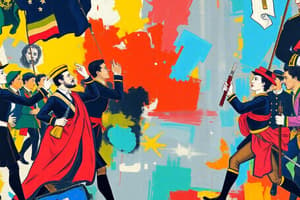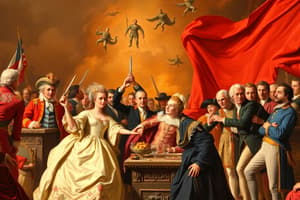Podcast
Questions and Answers
What event occurred on July 14, 1789, and inspired other French citizens to rise against the monarchy?
What event occurred on July 14, 1789, and inspired other French citizens to rise against the monarchy?
- The execution of the governor
- The March on Versailles
- The storming of the Bastille (correct)
- The National Assembly's formation
What prompted the angry crowd of women to march to Versailles in October 1789?
What prompted the angry crowd of women to march to Versailles in October 1789?
- Concerns over bread shortages and the King's actions (correct)
- A protest against the Constitution of 1791
- A call for the King to leave Paris
- A desire to support the National Assembly
What was a direct consequence of the women storming the palace at Versailles?
What was a direct consequence of the women storming the palace at Versailles?
- The execution of the King
- The establishment of a monarchy
- The King agreeing to move the government to Paris (correct)
- The immediate drafting of a new constitution
What did the Constitution of 1791 formally legitimize?
What did the Constitution of 1791 formally legitimize?
Which action was taken by the mob during the March on Versailles?
Which action was taken by the mob during the March on Versailles?
What was the outcome of the Civil Constitution of the Clergy?
What was the outcome of the Civil Constitution of the Clergy?
Which group primarily made up the National Convention?
Which group primarily made up the National Convention?
What significant event did George Jacques Danton emphasize regarding France's military stance?
What significant event did George Jacques Danton emphasize regarding France's military stance?
What was the primary aim of the levee en masse?
What was the primary aim of the levee en masse?
What demographic felt particularly excluded during the early stages of the French Revolution?
What demographic felt particularly excluded during the early stages of the French Revolution?
What was the primary objective of the members of the 3rd Estate when they formed the National Assembly?
What was the primary objective of the members of the 3rd Estate when they formed the National Assembly?
What significant action did the 3rd Estate take on June 20th, 1789?
What significant action did the 3rd Estate take on June 20th, 1789?
What was one of the proposals the National Assembly considered to alleviate the food crisis in France?
What was one of the proposals the National Assembly considered to alleviate the food crisis in France?
What declaration was announced by the National Assembly in August 1789?
What declaration was announced by the National Assembly in August 1789?
What event marked the beginning of popular revolutionary action in Paris?
What event marked the beginning of popular revolutionary action in Paris?
What was the Bastille primarily known for before it was stormed?
What was the Bastille primarily known for before it was stormed?
Which phrase describes the core ideals expressed in the Declaration of the Rights of Man?
Which phrase describes the core ideals expressed in the Declaration of the Rights of Man?
How did the National Assembly aim to address the issues regarding church land?
How did the National Assembly aim to address the issues regarding church land?
Flashcards
Storming of the Bastille
Storming of the Bastille
The storming of the Bastille on July 14, 1789, marked the beginning of the French Revolution. Citizens captured weapons, freed prisoners, and symbolically destroyed the fortress, representing the monarchy's power and oppression.
March on Versailles
March on Versailles
A group of women marched from Paris to Versailles in October 1789 to protest the king's actions against the National Assembly and the lack of bread. They forced the King to move the government back to Paris, strengthening the Assembly's power.
National Assembly
National Assembly
The National Assembly, formed during the French Revolution, gained legitimacy and power through the events like the March on Versailles. This assembly played a key role in establishing a new government and creating a constitution.
Constitution of 1791
Constitution of 1791
Signup and view all the flashcards
French Revolution
French Revolution
Signup and view all the flashcards
Constitutional Monarchy
Constitutional Monarchy
Signup and view all the flashcards
Freedom of Religion
Freedom of Religion
Signup and view all the flashcards
Civil Constitution of the Clergy
Civil Constitution of the Clergy
Signup and view all the flashcards
Division into Departments
Division into Departments
Signup and view all the flashcards
Limited Right to Vote
Limited Right to Vote
Signup and view all the flashcards
What was the National Assembly?
What was the National Assembly?
Signup and view all the flashcards
What was the Tennis Court Oath?
What was the Tennis Court Oath?
Signup and view all the flashcards
What happened at the storming of the Bastille?
What happened at the storming of the Bastille?
Signup and view all the flashcards
What was the Declaration of the Rights of Man and of the Citizen?
What was the Declaration of the Rights of Man and of the Citizen?
Signup and view all the flashcards
Who was the Third Estate?
Who was the Third Estate?
Signup and view all the flashcards
What was feudalism?
What was feudalism?
Signup and view all the flashcards
What was the bread shortage issue?
What was the bread shortage issue?
Signup and view all the flashcards
Who was the King of France?
Who was the King of France?
Signup and view all the flashcards
Study Notes
Nation as a Collective
- A nation can be viewed as something found within the collective consciousness
- Understanding a nation can be explored by examining connecting factors
- Ethnic background and ancestry
- Cultural values and beliefs
- History
- Language
- Religious beliefs
- Geography
- Politics and citizenship
Nation-State
- A nation-state is a political entity with internationally recognized borders and a sovereign government
- A nation is more abstract, related to the feelings and minds of people
- A nation-state is concrete and external, considered sovereign (independent) because other nations recognize its right to govern itself independently
- Often countries, nation-states can hold many different nations within them
Ethnic Understanding of Nation
- Language is a component of ethnic nationalism
- Nations can share similar ethnic characteristics like race, culture, or language
- Being united by shared characteristics can be advantageous.
- Grouping by shared characteristics can create a dislike towards other ethnicities
Geographic Understanding of Nation
- Geography heavily influences the development of a nation
- Regionalism can pull people together or separate them based on shared or different geographical similarities
- Geographic differences can affect cultural identities
The Making of a Civic Nation
- Civic refers to citizens who are key elements of a nation
- This is formed by two key elements
- Citizens
- Shared values and beliefs
- A nation can be described as such when its citizens share a commonality
Social Factors (Three Estates)
- First Estate - Clergy (~100,000): Religious leaders. Owning 1/5th of land and receiving half the income of the state.
- Second Estate - Nobility (~300,000): Held political influence and privileges, taxed lightly, occupying most government positions.
- Third Estate - Everyone Else (~26 million): Heavily taxed, many were poor, but not everyone. Included merchants, wealthy landowners, lawyers, and others. (Bourgeoisie)
- Roughly 95% of the population belonged to the third estate
Economic Factors
- France's economy was in ruin by the late 1780s due to continuous warfare with Britain
- King Louis XVI attempted to raise taxes upon all citizens including the second estate (nobility)
- This plan was met with resistance from the nobility
A Meeting of the Three Estates
- The King called a meeting of the Estates General in 1789 to address the economic and food crisis facing France.
- This was the first such meeting in 170 years.
- Each estate was given one vote.
- The meeting hoped to address issues from each estate and propose ideas to shape the future of France
Geographical Factors
- Economic crisis coincided with widespread crop failure and famine due to unfortunate weather events
- Bread shortages worsened for everyone, excluding the nobility, leading to widespread resentment of the royal court
Events of the Revolution (The National Assembly)
- The third estate formed the National Assembly in June 1789 after being ignored and outvoted.
- They met regularly to address French problems, such as abolishing feudalism to appease peasants
Events of the Revolution (Tennis Court Oath)
- The third estate was locked out of their meeting room after forming the National Assembly
- They met in an indoor tennis court and pledged to create a constitution
Events of the Revolution (Storming of the Bastille)
- The Bastille was a Paris prison where people who spoke out against the King were imprisoned - a symbol of the monarchy's oppression
- On July 14, 1789, 633 citizens stormed the Bastille, demanding supplies and weapons ,and releasing prisoners
- This inspired other French citizens to take up arms against the King
Constitution of 1791
- Formally legitimized the National Assembly
- Limited the Monarch to a Constitutional Monarchy
- Reformed the Roman Catholic Church (Civil Constitution of the Clergy)
- Established 83 French departments
The Beginnings of Terror
- France faced both a domestic and international crisis.
- Louis XVI was executed in January 1793 for treason.
- The Reign of Terror began as a way to control citizen rebellion against the National Convention.
- This involved the creation of the Committee of Public Safety which was headed by Maximilien Robespierre. This committee had unlimited power and ruled the nation.
Consequences of the Terror
- Thousands of innocent people were killed during the Reign of Terror
- Many of Robespierre's own friends were executed when they tried to stop the violence or oppose his policies
Bonaparte: Domestic
- Napoleon implemented many reforms in French society after becoming emperor
- France's relationships with the Catholic Church improved
- The slogan of the revolution was changed to "order, security, efficiency"
- The economy was stabilized, infrastructure projects were undertaken (building roads, canals, and a school system)
- Common law codes were made uniform
- Promotions were based on skill not social birth
Bonaparte: Foreign
- Napoleon sought to expand French control and create an empire
- Military victories were achieved against Russian and Austrian forces. Control expanded into Spain and Italy.
- Attempts to cripple the British were unsuccessful
- Non-French nationalism grew in places that Napoleon conquered (e.g. Spain and Germany)
What is Canada?
- National identity involves a sense of belonging to a collective or community
- Nationalism and identity often connect, with people defining themselves using the terms of group identity
Canadian History and Myths
- Canadian history is full of stories about adapting to, or taming, nature
- Shared stories, beliefs, and ideas that may or may not be accurate form a sense of national identity
- This is called a national myth
- National identity is influenced by these shared myths
Non-Nationalist Loyalties
- Include loyalties to other groups such as religion, region or culture
- In multicultural societies, cultural practices and beliefs influence loyalties to these groups.
- Diverse groups can coexist despite having different beliefs and views
Race, Ideology, and Class
- "Race" can cause conflict regarding a common national culture.
- Laws based on different "races" or beliefs may exacerbate differences
- Differences in ideas regarding society's roles, or differing economic beliefs (ideology) can divide individuals based on differing values
- Class, social and economic placement, can affect loyalty within communities
Pre-Confederation Canada
- British law determined that only English could be spoken by the Canadian legislature.
- This led to demands for responsible government - a system where the government must have the support of a majority of members to remain in power.
- English and French Canadians worked together to demand these changes
First Nations - Numbered Treaties
- The Numbered Treaties are eleven treaties signed between 1871 and 1921 by the Canadian government and indigenous peoples
- Some agreements included education, healthcare, and financial assistance if indigenous peoples surrendered their land rights
- The Indian Act of 1876 further defined terms and clarified rules regarding First Nations treaties
- "Status Indians" were first defined
Canadian Expansion, Westward Growth
- The Metis resisted Canadian expansion westward, feeling their culture and beliefs were under threat.
- Louis Riel led two resistance movements
- Canada expanded westward to encompass the land currently known today
- Immigration after this westward expansion prioritized White Christians of British or American descent.
Multiculturalism in Canada
- Canada has implemented multicultural policies in the hopes of recognizing different cultural groups, beginning in 1971
- Actions include immigration act changes as well as the Canada Act
- These actions will help redefine Canadian identity as it heads into the 21st century
Studying That Suits You
Use AI to generate personalized quizzes and flashcards to suit your learning preferences.





